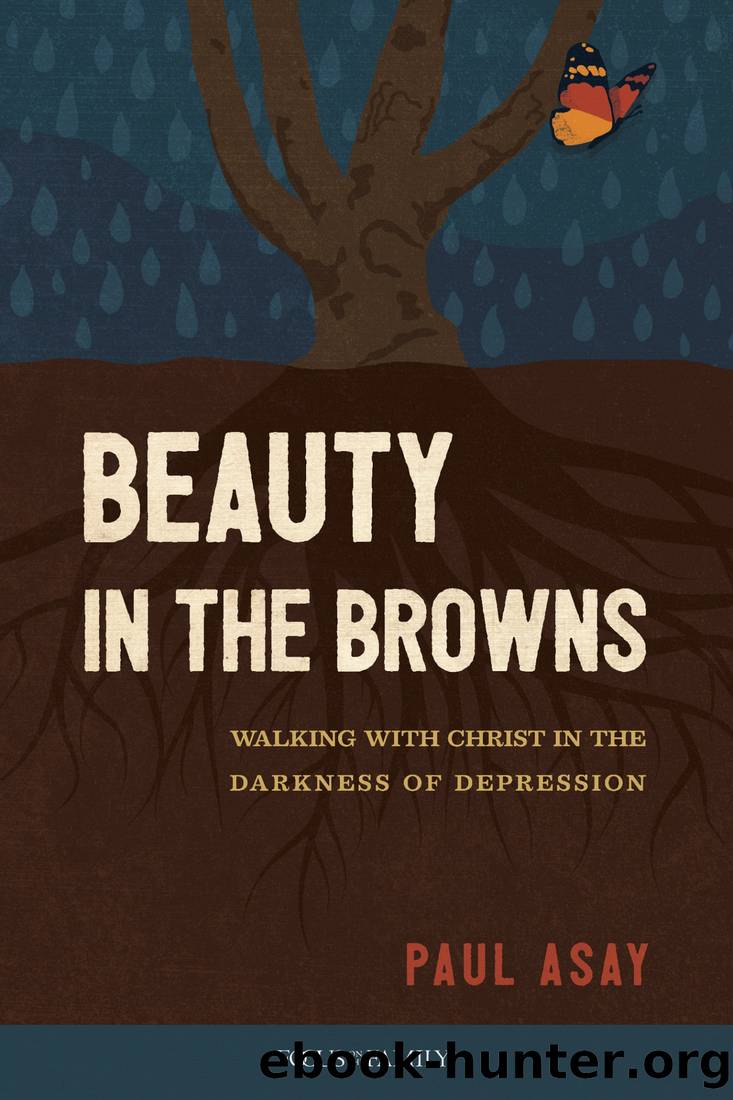Beauty in the Browns by Paul Asay

Author:Paul Asay [Asay, Paul]
Language: eng
Format: epub
Tags: RELIGION / Christian Living / Inspirational, RELIGION / Christian Living / Personal Growth
Publisher: Focus on the Family
Published: 2021-02-09T00:00:00+00:00
âEven those people whose faith promises them that this will all be different in the next world cannot help experiencing anguish in this one,â wrote Andrew Solomon in The Noonday Demon. And that is all too true. âChrist himself was the man of sorrows.â[12]
As I was writing this very chapter, the senior pastor for my church began a series on the prophet Elijahâsuggesting that even this mighty man of God suffered from depression.
He had lots of reasons to be depressed, of course. Iâve never had the queen of Israel plot to kill me.
Still, itâs striking when you read 1 Kings 19:4.
But he himself went a dayâs journey into the wilderness and came and sat down under a broom tree. And he asked that he might die, saying âIt is enough; now, O LORD, take away my life, for I am no better than my fathers.â
(Itâs also interesting that God walked Elijah through the same template that got me through my depressive episode when I was with the rodeo: time, love, and, frankly, a kick in the rear. God sent an angel to feed Elijah, sent him on a forty-day journey in the wilderness andâwhen Elijah still wasnât going anywhere but to the back of the caveâsaid, âWhat are you doing here, Elijah?â He then pushed him out to take care of some important business, which Elijah did, because even prophets need to cowboy up every now and again.)
Heâs not alone. Dealing with depression as I have, itâs curiously heartening to read about how many of Godâs chosen have fought despair, hopelessness, and even thoughts of wanting to just be done with it all.
Jonah told God that it was âbetter for me to die than to liveâ (Jonah 4:3). Jeremiah is sometimes called the âweeping prophetâ because of the misery he felt. Job, my favorite biblical depressive, âtook a piece of broken pottery with which to scrape himself while he sat in the ashesâ (Job 2:8). While lots of biblical commentators say all that scraping was meant to deal with the boils he was suffering with, the great nineteenth-century theologian Albert Barnes is one of several who suggest the scraping was meant also (in Barnesâs words) to ââindicateâ the greatness of his calamity and sorrow.â[13] (When I read the passage, I canât help but be reminded of cutting.)
David wrote many an anguished psalm. Other psalmists poured out their hurt and sorrow to God (and everyone else) in their songs. In Psalm 73, Asaph sounds deeply self-pitying for much of it, and then writes what might sound to some a poetic description of depression and what it can do to us:
Thus my heart was grieved,
And I was vexed in my mind.
I was so foolish and ignorant;
I was like a beast before You.
PSALM 73:21-22, NKJV
But then Asaph turns around and says what we depressed Christians should always ultimately say:
Nevertheless I am continually with You;
You hold me by my right hand.
You will guide me with Your counsel,
And afterward receive me to glory.
PSALM 73:23-24, NKJV
We canât know for certain that these characters suffered from depression.
Download
This site does not store any files on its server. We only index and link to content provided by other sites. Please contact the content providers to delete copyright contents if any and email us, we'll remove relevant links or contents immediately.
What Is the Gospel? (Foreword by D. A. Carson) by Greg Gilbert(988)
Jesus in Me by Anne Graham Lotz(937)
Daily Strength: Devotions for Bible Believing Study by Douglas Stauffer & Andrew Ray & Rick Quatro(893)
Christian Ethics by Wilkens Steve;(854)
The Practice Is the Path by Tias Little(816)
New Morning Mercies by Tripp Paul David(806)
Cleaning Up Your Mental Mess by Dr. Caroline Leaf(736)
Veritas: A Harvard Professor, a Con Man and the Gospel of Jesus's Wife by Ariel Sabar(721)
Greatest Mystery in the World by Og Mandino(651)
The Creative Call by Janice Elsheimer(595)
No More Christian Nice Guy by Paul Coughlin(581)
Our Appointment with Life by Thich Nhat Hanh(571)
Monastic Archaeology by Unknown(564)
2084 by John C. Lennox(556)
This One Wild and Precious Life by Sarah Wilson(542)
Jesus--Awesome Power, Awesome Love (Discover 4 Yourself® Inductive Bible Studies for Kids) by Kay Arthur(529)
The Duties of Parents by J.C. Ryle(512)
The Catholic Verses: 95 Bible Passages That Confound Protestants by Dave Armstrong(509)
The Tale of the Tardy Oxcart (Swindoll Leadership Library) by Swindoll Charles R(491)
